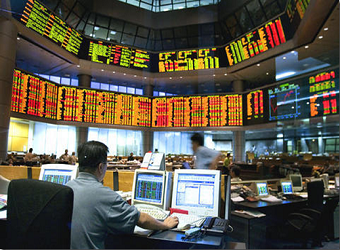Asian stock markets wavered during Monday trade after U.S. stocks ended mostly lower on Friday, with Japan’s Nikkei 225 index ending lower for the fourth straight session.
Markets on the move
The Nikkei 225 fell 1.32 percent, or 300.43 points, to close at 22,380.99 — its lowest close since October 31. Trading houses, financials and tech plays ended mostly lower. Energy-related stocks, however, were mixed against the broadly declining index: JXTG Holding closed up 1.69 percent while Inpex slid 1.66 percent.
Across the Korean Strait, the Kospi edged down 0.5 percent to end at 2,530.35 as gains in automakers and cosmetics stocks were offset by losses in manufacturing names: Amorepacific closed up 0.62 percent, Hyundai Motor jumped 3.88 percent and Samsung Heavy fell 2.78 percent by the end of the session.
Down Under, the S&P/ASX 200 slipped 0.13 percent to close at 6,021.77. Moderate losses in the heavily-weighted financials sub-index, which fell 0.53 percent, weighed on the broader index.
Greater China markets proved to be a bright spot in the region. The Hang Seng Index rose 0.32 percent by 3:00 p.m. HK/SIN. On the mainland, the Shanghai Composite rose 0.47 percent to finish the session at 3,448.68 while the Shenzhen Composite edged up 0.30 percent to close at 2,045.18.
Shares of Country Garden Holdings and Sunny Optical Technology (Group) got a boost after the companies were included in the Hang Seng Index. Property developer Country Garden jumped 6.03 percent and Sunny Optical advanced 5.19 percent by 3:03 p.m. HK/SIN. Meanwhile, Cathay Pacific Airways and Kunlun Energy fell 0.65 percent and 3.23 percent, respectively by 3:03 p.m. HK/SIN, after being removed from the index.
Bank stocks traded on the mainland closed the session higher following an announcement last week that China would be easing foreign ownership rules in the financial sector: ICBC closed up 2.41 percent, and Merchants Bank rose 2.14 percent by the end of the session.
Although there was no lack of events, there was “a sense of dulled direction and motivation” in the markets, Vishnu Varathan, head of economics and strategy at Mizuho Bank, said in a morning note.
U.S. stocks mostly closed lower on Friday, extending losses made on Thursday. The Dow Jones industrial average slid 0.17 percent, or 39.73 points, to end at 23,422.21.
The lead up
Eleven countries have agreed on “core elements” in a regional trade pact from which the U.S. pulled out earlier this year. Japan has led talks for the trade deal, called the Comprehensive and Progressive Agreement for Trans Pacific Partnership (CPTPP), since the U.S. withdrew. Reuters reported the agreement had not yet been finalized.
Elsewhere, Saudi Arabia has called for an urgent Arab League minsterial meeting to discuss Iran’s role in the region. The meeting, which comes on the back of elevated tensions, is expected to be held in Cairo, Reuters said.
Corporate news
E-commerce giant Alibaba said it brought in a record $25 billion in sales on Singles’ Day this year, above last year’s haul of $17.8 billion. The online shopping event, which initially began as an anti-Valentines’ Day celebration of sorts, takes place annually on Nov. 11.
Meanwhile, ride-hailing platform Uber is on the verge of reaching an agreement to sell a stake of the company to Japan’s SoftBank, the New York Times reported. The deal would see a group of SoftBank-led investors take a stake of at least 14 percent in Uber, the Times added. Shares of SoftBank closed down 0.3 percent.
Razer, a gaming hardware company, was in focus as it made its debut on the Hong Kong Exchange. The company’s shares rose more than 30 percent above its issue price of HK$3.88 at the open. Razer’s listing follows China Literature’s Hong Kong debut last week, which saw the Tencent-backed online literature platform’s stock rise some 90 percent on its first day of trade.
Watching the dollar
The British pound fell to trade at $1.3113 at 2:49 p.m. HK/SIN compared to levels around the $1.318 handle seen at the end of last week. Markets digested headlines that 40 Conservative members of Parliament intended to sign a letter of no-confidence in British Prime Minister May as Brexit talks dragged on.
The Australian dollar edged up to $0.7657 after trading as low as $0.7638 earlier in the day. The currency had been pressured following the release of the Reserve Bank of Australia’s quarterly statement last week.
“[U]nless there is massive surprise in the data or an abrupt shift in RBA rhetoric, who appear sidelined indefinitely on tepid growth and apathetic inflation figures, the Aussie should remain pressured,” Stephen Innes, Asia Pacific head of trading at OANDA, said in a note.
Moves in the currency also followed after news of yet another member of Parliament resigning on Saturday due to citizenship issues. The Australian constitution blocks dual nationals from Parliament.
The dollar index, which tracks the U.S. dollar against a basket of six currencies, stood at 94.505 at 2:49 p.m. HK/SIN, above Friday’s close of 94.392 but below levels around the 94.7 handle early last week.
The commodities trade
Oil prices were steady after slipping on Friday. U.S. West Texas Intermediate crude inched higher by 0.07 percent to trade at $56.78 a barrel and Brent crude futures were flat at $63.52.
Source: CNBC


